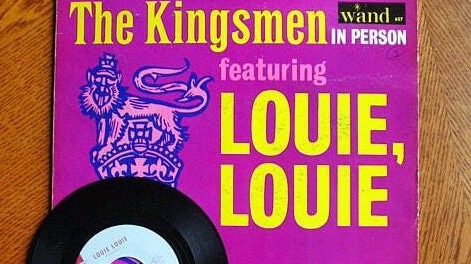The Complete Story about “Louie Louie” by the Kingsmen
The year was 1964, January. The musicians were the Kingsmen, out of Portland, Ore. The recording was their cover of “Louie Louie,” about a mariner who pines for a girl.
Fact: With the exception of Paul McCartney’s “Yesterday,” it’s been covered more times than any other pop song (over 1,000 versions and counting).
On January 11, 1964 ‘Louie Louie’ by The Kingsmen was No.1 on the Cashbox Chart (Billboard’s competitor). The song was banned by a few US radio stations due to its indecipherable lyrics (naughty words). The F.B.I. investigated the song, but concluded that they could find nothing
Louie Louie” was written by a minor songwriter and performer from Los Angeles named Richard Berry (no relation to Chuck Berry) and was recorded several times in the 1950s, including by Berry, in 1957. In those recordings the lyrics were discernible. Those recordings created no stir and not a lot of sales.
Since the time of “Louie Louie,” poor enunciation has become a music industry staple. From Iron Butterfly’s “In-A-Gadda-Da-Vida” (1968) to Pearl Jam’s “Yellow Ledbetter” (1992) to Young Thug’s and Rich Homie Quan’s “Lifestyle” (2014), audiences have become accustomed to not knowing the words to songs.
Like many things there are two versions.
1.) Jack Ely, lead singer of The Kingsmen got drunk for the recording. That’s why it was hard to understand.
2.) The way Jack Ely tells it he was wearing braces on his teeth.
But in 1964, pop singers made themselves understood. “Louie Louie” was released into a world where Bobby Vinton’s “There! I’ve Said it Again” and “Dominique,” by Jeannine “The Singing Nun” Deckers, were chart-toppers. Listen for 10 seconds to “Dominique” or “There! I’ve Said it Again” and you’ll better understand the freak-out over primal “Louie Louie.”
The beneficiaries of all this were of course the Kingsmen, who thanks to the publicity sold hundreds of thousands of records and became nationally famous. In 2007 Rolling Stone magazine pronounced their recording of “Louie Louie” “the #4 most influential recording of all time.”
Audio Recorders Inc. managed to record, produce or engineer just about every important northwest artist of the day. The Frantics, The Wailers, Little Bill and The Bluenotes, The Ventures, The Sonics, The Kingsmen, Dave Lewis, The Dynamics, and Merilee Rush; the list barely scratches the surface.
Aside from a handful of other less modest successes, Seattle and Tacoma put out regional hit after regional hit, but it was two Portland bands of the day that set the template for national success. In retrospect we can see the tremendous contributions to rock that Tacoma’s The Fabulous Wailers or The Sonics have made; but their initial releases usually stalled somewhat high in the national charts, if even that far. It was Portland’s The Kingsmen and Paul Revere and the Raiders (with their roots in Caldwell Idaho) who made the biggest commercial splash.
Both bands recorded renditions of the song ‘Louie Louie’ that led them to the national spotlight, even though Rockin’ Robin (actually The Wailers) and Little Bill had done earlier versions. By the time The Raiders recorded ‘Louie Louie’ they had already seen interest from Columbia Records on the strength of an earlier, instrumental, boogie-woogie influenced release on Gardena Records called ‘Like, Long Hair’. ‘Like, Long Hair’ reached number 38 on the Billboard Charts. Although the initial pressing of Paul Revere and The Raiders’ version of Louie Louie first appeared on the Sandé label, the band was signed to Columbia right away and their version of ‘Louie Louie’ was released on Columbia Records.
The Kingsmen’s version of ‘Louie Louie’ had originally been released in a pressing of 1000 copies on Seattle’s Jerden Records. The band members were pretty much left to their own devices, selling copies to friends, members of their audiences and hawking them to club and radio disc jockeys. The Kingsmen version languished behind the Paul Revere and The Raiders version for several months before success came via Boston radio DJ Arnie “Woo-Woo” Ginsburg. It was his nightly exposure of The Kingsmen’s version-ironically voted nightly for weeks as the day’s ‘worst song’, while it was actually the day’s most requested. Fans of the song continued to vote it the ‘worst’ just to hear it nightly.
Wand Records, run out of New York City, was a subsidiary of the very successful Scepter label and had the power to make The Kingsmen’s version a number one hit that far outsold the Raiders version. Paul Revere and The Raiders went on to produce a string of hits during the 1960s (Kicks, Hungry, Indian Reservation, etc.) and garnered a regular TV spot on Dick Clark’s week-day ‘Where The Action Is’ program in 1965 and 1966. The Kingsmen never again dented the national charts the way they had with ‘Louie Louie’ but their definitive version of the song has outperformed all of the songs of Paul Revere and The Raiders…and that’s saying a lot since The Raiders put out some pretty good garage and pop singles.
The local Portland dance music scene had already been popular in the very early 60s but it practically exploded after the success of The Kingsmen and Paul Revere and The Raiders. Musicians in Portland, Eugene, Corvallis, Salem and other towns and cities around Oregon realized how potent the music coming out of the state could be. It’s said that by 1965 there were roughly 300 working bands in the Portland area alone.
Backstory:
The Kingsmen saw Paul Revere and The Raiders doing it at a gig, went in the studio the next day and recorded it … Paul never spoke to them again.





